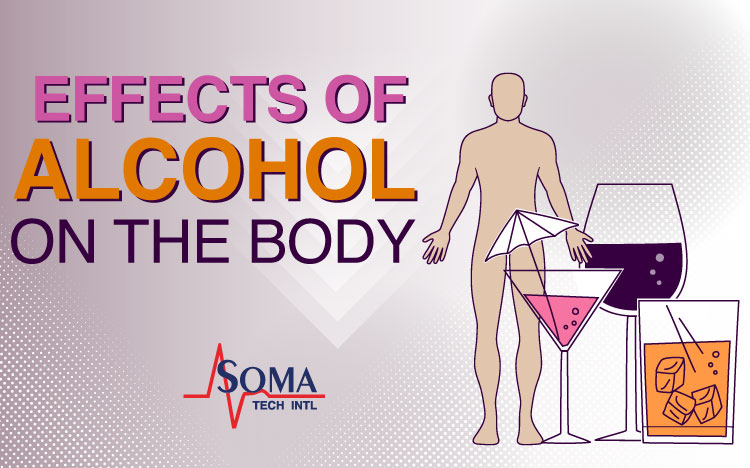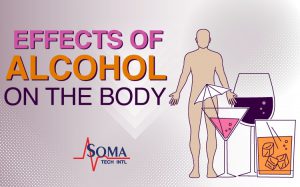Effects of Alcohol on the Body
April 14, 2023

1. What is Alcohol Actually
2. Short-Term Effects of Alcohol
3. Long-Term Effects of Alcohol
4. How to Drink Responsibly
What is Alcohol Actually
Alcohol is a type of psychoactive substance that is produced through the process of fermentation or distillation. It is a liquid that is commonly consumed in various alcoholic beverages, such as beer, wine, and spirits. The active ingredient in alcoholic beverages is ethanol, which is a central nervous system depressant that can have psychoactive effects on the brain and body. Alcohol can have both short-term and long-term effects on the body and mind. In small to moderate amounts, it can produce relaxing and euphoric effects, lower inhibitions, and increase sociability. However, excessive or chronic alcohol consumption can lead to a wide range of negative health effects. This blog will explore the long-term and short-term effects of alcohol on the body, while also giving you helpful tips on how to drink responsibly.
Short-Term Effects of Alcohol
Alcoholism, also known as alcohol use disorder (AUD), can have various short-term effects on a person’s physical, mental, and social well-being. Some of the short-term effects of alcoholism may include:
- Intoxication: One of the most noticeable short-term effects of alcoholism is intoxication, which occurs when a person consumes alcohol in excess of their body’s ability to metabolize it. Intoxication can result in impaired judgment, loss of coordination, slurred speech, altered mood or behavior, and slowed reflexes, which can increase the risk of accidents, injuries, and risky behaviors.
- Hangovers: Excessive alcohol consumption can lead to hangovers, which are characterized by symptoms such as headache, nausea, vomiting, fatigue, dizziness, and dehydration. Hangovers can cause discomfort, disrupt daily activities, and impair productivity and concentration.
- Short-term Health Risks: Alcoholism can increase the risk of short-term health risks such as injuries and accidents, including falls, motor vehicle accidents, burns, drownings, and other traumatic injuries. Alcohol can also interact with medications, leading to adverse reactions and complications.
- Impaired Cognitive Function: Alcohol is a central nervous system depressant that can impair cognitive function, including memory, attention, concentration, and decision-making. Short-term alcoholism can result in decreased mental acuity, impaired judgment, and reduced ability to perform complex tasks.
- Social and Legal Consequences: Short-term effects of alcoholism may also include social and legal consequences, such as strained relationships with family and friends, and legal problems such as arrests for driving under the influence (DUI), public intoxication, and other alcohol-related offenses.

It’s important to note that the short-term effects of alcoholism can vary depending on individual factors such as tolerance, amount and frequency of alcohol consumption, and overall health. However, even short-term excessive alcohol consumption can have significant negative effects on physical health, mental well-being, and social functioning, emphasizing the importance of responsible alcohol use and seeking help if you or someone you know is struggling with alcoholism.
Long-Term Effects of Alcohol
Alcoholism is characterized by compulsive and uncontrolled consumption of alcohol by a person, despite negative consequences on their health, relationships, and daily life. Over a prolonged period, alcoholism can have serious and far-reaching effects on various aspects of a person’s life.
- Physical Health: Long-term alcoholism can significantly affect physical health. Excessive and prolonged consumption of alcohol can cause liver damage, leading to conditions such as alcoholic liver disease, cirrhosis, and liver failure. Alcoholism can also affect the cardiovascular system, increasing the risk of high blood pressure, heart disease, and stroke. Other effects of alcoholism on physical health can include gastrointestinal problems, nutritional deficiencies, a weakened immune system, sexual dysfunction, and increased risk of certain types of cancer.
- Mental Health: Alcoholism can have a significant impact on mental health. Long-term alcohol abuse can lead to mental health problems such as depression, anxiety, and an increased risk of developing mood disorders. Chronic alcohol use can also lead to cognitive decline, including memory problems, decreased attention span, and impaired decision-making skills. In some cases, long-term alcoholism can cause irreversible brain damage, such as Wernicke-Korsakoff syndrome, a severe form of cognitive decline caused by thiamine (vitamin B1) deficiency.
- Social and Interpersonal Relationships: Alcoholism can strain long-term social and interpersonal relationships. Excessive and compulsive drinking can lead to strained relationships with family, friends, and colleagues. It can also lead to financial hardship, legal problems, and decreased job performance or job loss. Additionally, alcoholism can result in social isolation, as people may withdraw from social activities or lose interest in hobbies and other activities they once enjoyed.
- Quality of Life: Alcoholism can significantly affect a person’s overall quality of life. The negative effects of alcoholism on physical and mental health, relationships, and other areas of life can lead to reduced quality of life. Chronic alcohol use can disrupt daily routines, hinder personal and professional growth, and cause a diminished sense of well-being and happiness.
- Risk of Addiction and Overdose: Long-term alcoholism increases the risk of addiction and tolerance, leading to the need for greater amounts of alcohol to achieve the desired effects. This can lead to a dangerous cycle of increased alcohol consumption, which can result in an increased risk of overdose and alcohol poisoning, both of which can be life-threatening.

Alcoholism can have serious and far-reaching effects on a person’s physical health, mental health, social relationships, quality of life, and general well-being. Seeking timely and appropriate treatment, including medical, psychological, and social support, is crucial for people struggling with alcoholism to mitigate the long-term effects and achieve recovery. If you or someone you know is struggling with alcoholism, it’s important to seek professional help from a qualified healthcare provider or addiction specialist.
How to Drink Responsibly
Drinking responsibly means consuming alcohol in a manner that minimizes potential harm to yourself and others. Here are some ways to drink responsibly:
- Set Limits: Establishing personal limits on the amount of alcohol you will consume in a given period can help you drink responsibly. It’s important to be aware of the recommended guidelines for moderate drinking, which generally advise no more than one drink per day for women and up to two drinks per day for men. It’s also essential to know your own tolerance and avoid exceeding your limits.
- Pace Yourself: Avoid drinking too quickly or “binge” drinking, which is defined as drinking five or more alcoholic drinks within a two-hour period for men, and four or more drinks for women. Pace yourself by drinking slowly, sipping water or non-alcoholic beverages between alcoholic drinks, and taking breaks to allow your body time to metabolize the alcohol.
- Eat Before and During Drinking: Consuming food before drinking and having snacks during drinking can help slow down the absorption of alcohol in your bloodstream, reducing its effects. Eating high-protein foods, such as cheese, nuts, or meat, can be particularly helpful in slowing down alcohol absorption.
- Do not Drink and Drive: Never drink and drive or operate any machinery or equipment while under the influence of alcohol. Plan for alternative transportation options in advance, such as designated drivers, public transportation, or ride-sharing services.
- Stay Hydrated: Alcohol is a diuretic, which can lead to dehydration. Drink plenty of water or other non-alcoholic beverages alongside alcohol to stay hydrated and minimize the negative effects of alcohol on your body.
- Know your Limits and Seek Help: Be aware of your own tolerance for alcohol and know when to stop. If you find it difficult to control your drinking or are experiencing negative consequences from alcohol use, such as problems with your health, relationships, or work, consider seeking help from a healthcare professional or a support group such as Alcoholics Anonymous (AA).
- Be Mindful of Others: Respect the drinking choices of others and never pressure anyone to drink more alcohol than they are comfortable with. If you notice someone else showing signs of intoxication, such as slurred speech, impaired coordination, or changes in behavior, intervene and assist them in getting the help they may need.
Drinking responsibly involves being mindful of your own alcohol consumption, knowing your limits, staying hydrated, avoiding drinking and driving, and being considerate of others. It’s important to remember that responsible drinking can help reduce the risks associated with alcohol use and promote overall health and well-being.
Explore Other Blog Items By Category
Recent Posts


Surgical Microscope Rentals


